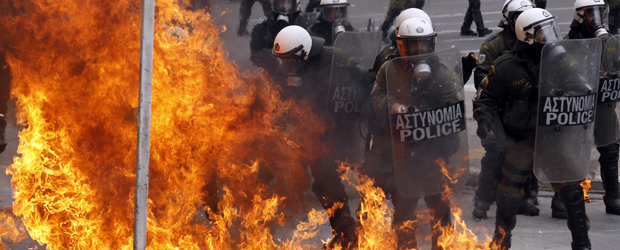Protests in Greece as eurozone demands cuts
A 48-hour nationwide strike against austerity measures hits Greece as eurozone finance ministers set out tough new conditions for the country’s 130bn euro bailout.

Eurozone finance ministers said the last-minute deal struck by Greek political leaders was not enough, with ministers at the 17-nation eurozone meeting in Brussels calling on the country to prove itself before they sign off on the next rescue package.
They have asked Greece to find a further 325 million euros in budget cuts by Wednesday, when ministers meet again.
The chairman of the meeting of eurozone finance ministers, Luxembourg Prime Minister Jean-Claude Juncker, said Greece must also ratify the 130bn euro bailout package this weekend if it is to receive aid.
“We would need to obtain strong political assurances from the leaders of the coalition parties on the implementation of the programme,” Juncker said.
“Those elements needs to be in place before we can take decisions. In short, no disbursement before implementation.”
“Those elements needs to be in place before we can take decisions. In short, no disbursement before implementation.” – Jean-Claude Juncker
The euro and financial markets fell on Friday, reflecting concern that the hard-won Greek deal on spending cuts and wage might not avoid a default.
Greeks who have struggled through five consecutive years of recession are becoming increasingly angry at the eurozone’s calls for even more stringent austerity cuts.
Read more: Greek euro exit could mean 'horrific scenario'
Unions have called for workers to rally in front of parliament, where Greek ministers are scheduled to meet later on Friday.
Ministers agreed on Thursday to cut the minimum wage by 22 per cent as part of budget cuts to secure the country’s much-needed bailout.
Overall unemployment in Greece surged above 20 per cent in November, but young people have been hardest hit by the recession. A staggering 48 per cent of people aged between 15 and 24 have no work.